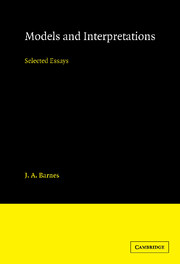Book contents
- Frontmatter
- Contents
- Preface
- Acknowledgments
- Introduction: social science in practice
- I MODELS OF THE REAL SOCIAL WORLD
- II MODELS OF SOCIAL SCIENCE
- 8 Feedback and real time in social inquiry (1967b)
- 9 Time flies like an arrow (1971f)
- 10 Kinship studies: some impressions of the current state of play (1980c)
- 11 Sociology in Cambridge: an inaugural lecture (1970m)
- 12 Social science in India: colonial import, indigenous product or universal truth? (1982c)
- III A MODEL OF MODELLING
- Postscript: structural amnesia (1947: 52–3)
- Bibliography
- Index
11 - Sociology in Cambridge: an inaugural lecture (1970m)
Published online by Cambridge University Press: 08 January 2010
- Frontmatter
- Contents
- Preface
- Acknowledgments
- Introduction: social science in practice
- I MODELS OF THE REAL SOCIAL WORLD
- II MODELS OF SOCIAL SCIENCE
- 8 Feedback and real time in social inquiry (1967b)
- 9 Time flies like an arrow (1971f)
- 10 Kinship studies: some impressions of the current state of play (1980c)
- 11 Sociology in Cambridge: an inaugural lecture (1970m)
- 12 Social science in India: colonial import, indigenous product or universal truth? (1982c)
- III A MODEL OF MODELLING
- Postscript: structural amnesia (1947: 52–3)
- Bibliography
- Index
Summary
In Chapter 8 my discussion was directed at the differences between natural and social sciences; in this chapter I try to distinguish between the social sciences and the humanities. The University of Cambridge, in which this chapter was delivered as my inaugural lecture, had delayed so long in first appointing a professor of sociology that by the time I arrived in 1969 not only had the funds for new developments begun to dry up but also the period of world-wide student unrest had begun. Sociology students are recognized as leaders of this unrest. The decision to expand the teaching of social sciences in the university had been reached only in the face of widespread hostility, and even some of the supporters of sociology opposed the move because they feared that by treating sociology as a distinct discipline the teaching of related subjects such as history would become less sociological.
In these circumstances I thought that in my inaugural I should make as strong a case as possible for sociology being a science rather than one of the humanities, but also a distinctively social, and not a natural, science. I also tried to emphasize that sociology is inherently an iconoclastic social science, and that its students must be expected to be iconoclasts. Somewhat unfairly I took the Cambridge philosopher and reformer Henry Sidgwick as my anti-hero, mainly so that I could show that the university, notorious for its caution about accepting new disciplines into its curriculum, had already had ample time to reconcile itself to the advent of sociology. […]
- Type
- Chapter
- Information
- Models and InterpretationsSelected Essays, pp. 181 - 195Publisher: Cambridge University PressPrint publication year: 1990



